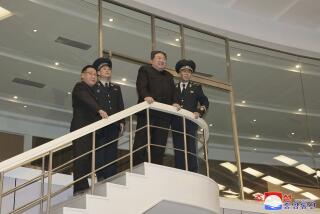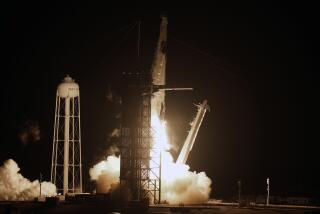China Told It Can Launch U.S.-Made Satellite in 1989
WASHINGTON ŌĆö The Reagan Administration said Friday that it is planning to allow China to launch an American-made commercial communications satellite next year, the first time the United States has permitted a non-Western government to handle a U.S.-made satellite.
The decision, which is subject to approval by Congress, was designed to keep American satellite-makers competitive in the face of a series of U.S. launch failures and the shutdown of the American space shuttle program after the Challenger accident in January, 1986.
The move marks a reversal of previous policy, which prohibited the export of U.S.-made satellites for launch by any but Western governments. U.S. law still prohibits the shipment of satellites abroad for launching within the Soviet Union, which also provides such services.
Case-by-Case Rulings
A State Department spokesman said the United States and China would form a joint government monitoring agency to develop procedures to protect the satellite technology--including controls on access by Chinese personnel. Any shipment would depend on the completion of such a pact.
The spokesman said Washington would continue to consider export licenses for future launches by China on a case-by-case basis. He indicated that the Administration has no plans to try to extend its policy to allow launches of U.S.-made satellites by the Soviet Union.
The Administration on Friday actually approved launches by China of three commercial satellites built by Hughes Aircraft--two manufactured for AusSat, the Australian space communications agency, and one purchased by AsiaSat, a consortium involving China, Hong Kong and Britain.
The AsiaSat satellite, formerly known as Westar-VI, was placed in orbit, then rescued by the U.S. space shuttle in November, 1984, and returned to Earth. After it was refurbished, it was sold to the three-member consortium and is scheduled to be launched next year.
Pledge to Be Sought
The two Australian satellites are slated to be launched in 1991 and 1992 respectively. State Department officials insisted Friday that none of the three has any military applications.
In addition to the guarantees concerning security of the technology, the State Department said it plans to seek a formal pledge from the Chinese to prevent unfair pricing or trade practices involving the sale of such launching services.
Officials said the United States will insist that both pacts be completed before any satellites are allowed to leave American territory.
More to Read
Sign up for Essential California
The most important California stories and recommendations in your inbox every morning.
You may occasionally receive promotional content from the Los Angeles Times.










